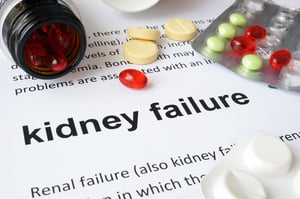15 Symptoms of Kidney Failure
By Susan Eymann, MS24 Jul 2019
Excerpted from Emily Lockhart
Sunday, March 25th, 2018
The gradual progression from unhealthy kidneys to chronic kidney disease (CKD) and finally to kidney failure is often very subtle with very few symptoms in the early stages. Fifteen of the most common signs of kidney failure include: 
- Pain in the Legs or Back: The most typical sign of chronic kidney disease (or CKD) is lingering pain in the legs and the upper back, close to where the kidneys are situated.
- Urinary Urgency: When the kidneys are jeopardized, one might have to urinate more frequently, often in the middle of the night, with increased pressure, and in larger quantities
- Fatigue: Healthy kidneys produce adequate amounts of the EPO (or erythropoietin) hormone, which command oxygen-carrying red blood cells to energize the muscles and brain. Without adequate EPO, your body and brain will fatigue often and you’ll require more sleep than usual.
- Swelling: As kidneys fail they slow the elimination of fluid from the body. Excess fluid pools in extremities, resulting in swollen legs, hands, ankles, and feet.
- Irritated Skin: Unhealthy kidneys, or kidneys in failure, are unable to flush waste out of the body via urine as effectively, which may cause signs of excess toxicity on the surface of your skin presenting as acne, rashes, dry skin, irritated red skin, hives, and severely itchy skin.
- Nausea: Increased toxic waste that can’t be eliminated via blood or urination will often casue nausea as well as a lack of appetite and weight loss.
- Metallic Flavor: Patients, whose kidneys fail, will often describe a metallic taste (Ammonia Breath) due to uremia that lingers in the mouth in the weeks and months prior to actual kidney failure.
- Anemia: Those with partial to full kidneys failure can develop anemia at almost any stage of CKD which leads to tired muscles, weakness, and overall fatigue.
- Confusion: Due to the lack of oxygen-carrying blood cells in the body (anemia) due to kidney failure will often feel confused or become fairly forgetful.
- Shortness of Breath: Shortness of breath is symptom can be casued by excess fluid build-up that causes the pressure and tension surrounding the lungs and anemia.
- High Blood Potassium: The kidneys are responsible for balancing potassium intake (through food and fluids) with how much is lost through urine. If they become damaged or fail, however, this function is disrupted, leading to elevated levels of potassium in the blood (hyperkalemia).
- Seizures or Coma: Impairments such as anxiety, trouble concentrating, and brain fog may occur due to a lack of oxygen in the brain, that result from a build up of toxins in the body that the damaged kidneys are unable to filter out. If this build up becomes extreme, it can lead to seizures or, in extreme cases, even coma.
- Difficulty Sleeping: Another common cognitive issue that can occur with kidney failure and toxic build up in the blood is trouble falling asleep and staying asleep.
- Excessive Thirst: Unquenchable thirst results as the body attempts to combat the loss of fluids due to frequent urination.
- Sexual Problems: Impaired kidney function can also lead to decreased sex drive in men and women that may be due to low testosterone or anemia.
Reference: http://www.activebeat.com/your-health/7-symptoms-of-kidney-failure/




